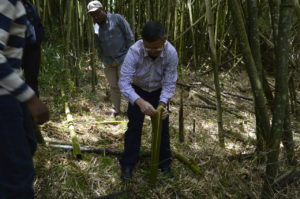Kuki Njeru’s eyes sparkle as she discusses her bamboo business. “There’s immense potential in restoring the gullies with bamboo,” she says. “Not only does it grow well on degraded land, it helps stabilize soils and prevent erosion as well.”
A co-founder of GreenPot Enterprises, Kenya’s first integrated bamboo company, Njeru is the face of a rapidly emerging new restoration economy in Kenya. Founded in 2014, GreenPot has shown there is profit in rehabilitating degraded land with bamboo, a fast-growing plant with versatile applications in the energy, construction and textile industries. In the past 18 months, the company has become profitable, managing about 400 hectares (1,000 acres) of bamboo and bringing in more than $2 million in sales.
GreenPot is not alone. Across the country, Kenyan entrepreneurs are seeking to demonstrate that with the right business model, restoration companies can have environmental and social impact while delivering financial returns. From community conservancies that engage in ecotourism and sustainable livestock to financial software companies that help incentivize smallholder restoration, these enterprises are challenging the popular notion that capitalism is at odds with the environment.
Their approach is also distinct from companies that have acknowledged the benefits of healthy forests and committed to minimizing environmental impact, but whose business operations do not integrate restoration. Here, restoring landscapes isn’t just good for business; restoring landscapes is the business.
About GreenPot Enterprises:
GreenPot Enterprises Limited is Kenya’s first fully integrated bamboo company, with operations ranging from large-scale nurseries to establishment of bamboo plantations. Plans to set up the country’s first commercial bamboo factory are in high gear. GreenPot’s proposition is a high impact business experience that seeks to transform individual, community and national fortunes through a raft of innovative bamboo based concepts and initiatives.
The bamboo forest establishment plan involves a combination of the gated communities plus an elaborate community outreach scheme through which out-growers are encouraged to participate in bamboo production vide a series of incentives and support measures. There are five main areas of the company’s impact: GreenPot plans to set a number of factories in diverse parts of the country. The first factory is set to be completed by 2017.
The proposed factories will produce the following products:
- Construction industry– flooring, block boards, veneers and timber;
- Energy industry– Brickets, pellets;
- Textile industry – various.
GreenPot’s goals include:
- Economic transformation of local communities and stake-holders in the Gated Communities through the introduction of a lucrative land-use innovation and a winning investment proposition;
- Provision of green energy products for domestic and industrial use (briquettes and pellets), therefore contributing greatly to reducing land degradation.
- Climate change mitigation and adaptation through spread of bamboo forests;
- Overall supply of wood needs – from flooring products to timber and other construction materials, thereby easing pressure on existing woodlands and forests;
- Quality employment and business opportunities for thousands of people, particularly women and the youth.


